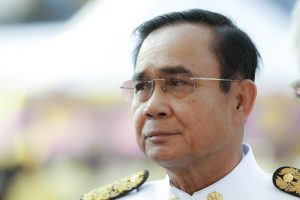Thailand’s main opposition party has launched a new and possible quixotic bid to unseat Prime Minister Prayut Chan-o-cha, arguing that he should leave office as early as this month.
Prayut’s current term in office will finish in March 2023, but in an interview granted to Reuters, by the Pheu Thai Party (PTP)’s legal expert Chusak Sirinin said that the party believes that the five years he spent as the head of a military junta after the military coup of 2014 should count toward the eight-year constitutional limit on his time in office.
In March 2019, Prayut became prime minister following an election held under a military-drafted constitution that gave his party significant, and many say unfair, advantages. The PTP, the largest individual party in Thailand’s lower house of parliament, claims that Prayut’s tenure as prime minister began in August 2014, three months after the coup, and should therefore finish on August 23. Chusak said that the party will now ask the country’s Constitutional Court to rule on the question.
The Pheu Thai Party, which is associated with exiled former Prime Minister Thaksin Shinawatra, was in power at the time of the coup, which removed Thaksin’s sister Yingluck Shinawatra from power. Thaksin himself was toppled in a coup in 2006, and the country’s traditional elite has since expended vast amounts of political energy in keeping Thaksin’s proxies out of power.
The party’s likely move extends the state of near-constant low-level legitimacy crisis that has attended Prayut’s time as prime minister. Throughout 2020 and 2021, the government weathered a campaign of youth-led protests that called for the leader’s resignation, a new constitution, and – most explosively – demands for restrictions on the power of the country’s monarchy.
Late last month, the Thai leader and 10 members of his cabinet survived a parliamentary vote of no-confidence – Prayut’s fourth – that opposition parties brought on the grounds that they had mishandled the economy and ignored rampant corruption.
As with the vote of censure, the PTP bid to curtail Prayut’s term in office is unlikely to make much headway. Thailand’s high-level courts have a solid track record of ruling in favor of the interests of the ruling establishment clustered around the military and the monarchy, of which Prayut’s military-backed administration has styled itself the defender. And as the Reuters article notes, there are a number of different possible interpretations about when Prayut’s term in office legally began. One line of argument is that it began in 2017, when the junta-drafted constitution came into force, or when he began his term of office after the 2019 election.
In a separate move, the PTP also announced that it is planning to ask the National Anti-Corruption Commission to investigate the conduct of parliamentarians and senators who vote in favor of amending the electoral law.
Of course, the PTP’s move is designed less to succeed than to highlight and dramatize the fundamental illegitimacy of the Prayut administration. In this sense, it speaks to the political bitterness that will feed into Thailand’s next election, whenever it is held. More than eight years after Prayut’s government seized power from the civilian administration in order to put an end to Thailand’s paralyzing political divisions, those divides seem deeper than ever.
































